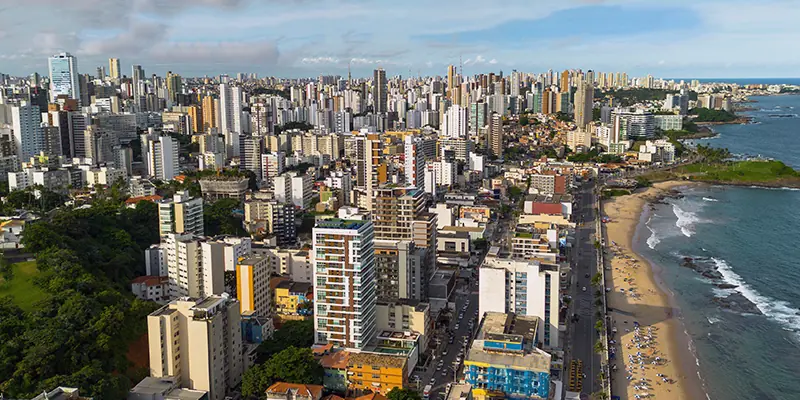African Diaspora
Salvador Bahia and the African Diaspora
Salvador Bahia and the African Diaspora are connected in ways that have significantly impacted the city’s culture. What exactly is the relationship between the city and Africa? Salvador, Bahia, Brazil is home to the greatest concentration of people of African heritage living outside of Africa. Like many others, I became more aware of this wonderful city through the well-known Michael Jackson music video, “They Don’t Care About Us”. Others may have simply been interested in history or the Brazilian carnival. There are probably many reasons people became aware of Salvador, but once you discover more about Salvador, Bahia it leaves a lasting impression. We will start by giving a quick overview of Salvador, Bahia, and then break it down into its connections with Africa.
Table of Contents
Salvador Bahia Overview

Salvador, the capital of the state of Bahia, was Brazil’s first colonial capital. One of the oldest, most culturally diverse and historically rich cities in Brazil is Salvador. The city is well-known for its vibrant colonial architecture and influences from Afro-Brazilian culture. The largest African-descent population outside of Africa is reportedly found in Salvador. Brazil’s tragic and painful past with the transatlantic slave trade is primarily responsible for the country’s sizable African population.
Pelourinho, a UNESCO World Heritage site, is located in Salvador. With contemporary beach neighborhoods along the Atlantic Ocean as a backdrop, Pelourinho is made up of buildings that date back to the 17th and 18th centuries, including churches and monasteries. Both the people and the city are welcoming. Salvador’s famed outdoor elevator, markets, festivities, music, drumming, and Afro-Brazilian capoeira on the old streets all contribute to the city’s uniqueness as a historical gateway to Brazil.
Beyond its historical facade, Salvador offers a modern metropolis brimming with energy. Discover contemporary art galleries in the trendy Barra district, indulge in delicious Bahian cuisine at waterfront restaurants, or sway to the rhythms of live music pulsating from local bars. Explore pristine beaches like Praia do Forte, where golden sands and turquoise waters invite relaxation.
Historical African Roots
The Afro-Brazilian community in Salvador has significant historical roots dating back to the transatlantic slave trade. The city was a key port for enslaved Africans, whose cultural effect has lasted for generations. More Africans were brought to the region of the Americas than any other part of the world. The music, dance, food, and religious traditions of the city’s residents have been influenced by the cultures of West and Central Africa. Some of the most popular region for the Portuguese slave traders were not limited to Angola, Gold Coast now Ghana, Benin and Nigeria.
Cultural Influence
The African diaspora in Salvador has made a profound impact on the city’s culture. Afro-Brazilian rhythms are prevalent in many different areas, such as music genres like samba and axé, traditional dances like capoeira, and vibrant festivals like Carnival, where Afro-Brazilian rhythms take center stage. This opens the door for visitors and residents alike to participate in the lively Carnival performances, to observe the mesmerizing capoeira movements, and to immerse themselves in the intoxicating sounds of samba. Salvador Bahia and the African diaspora or descents are forever interconnected with Brazilians’ history.
Candomblé and Spirituality
The Afro-Brazilian religion Candomblé, which combines Catholicism and African spirituality, has roots in the Yoruba, Fon, and Bantu cultures. It is a prominent religion in Salvador, Bahia, Brazil. Terreiros, or places of worship, are the focal points of rituals where people can communicate with Orishas, heavenly beings that symbolize the elements of nature. Rituals, dance, and music are essential for expressing devotion and preserving spiritual balance. Candomblé creates a strong bond between faith and everyday life by reflecting the Afro-Brazilian population’s rich cultural diversity and resilience. This is another aspect that strengthens the links between the African Diaspora in Salvador and their African heritage.
Afro-Brazilian Cuisine
Salvador, Bahia’s Afro-Brazilian cuisine culture is a rich blend of African, Indigenous, and Portuguese influences. Palm oil, coconut oil, dendê oil, and a range of tropical fruits and spices are key ingredients. Famous dishes include acarajé, a deep-fried black-eyed pea dough stuffed with shrimp, and vatapá (a thick, spicy stew). Popular dishes include moqueca, a fish stew, and feijoada, a black bean and pork stew. The food reflects the region’s past while also celebrating ethnic diversity and providing a unique experience that combines African roots with Brazilian flavors.
Arts and Celebrations
Salvador’s cultural identity is heavily influenced by Afro-Brazilian art, literature, and visual expression. Artists frequently draw inspiration from their African origins, contributing to a dynamic artistic environment that reflects the Afro-Brazilian community’s diversity and resilience. The Afro-Brazilian community in Salvador takes part in and organizes cultural events such as Black Awareness Day. Additionally, these festivals serve as platforms for showcasing Afro-Brazilian history, heritage, and accomplishments, instilling pride and unity.
Challenges and Resilience
In spite of historical hardships, such as institutionalized discrimination and slavery, the Afro-Brazilian community in Salvador has demonstrated resilience. Initiatives and organizations work to address social issues and advance equality, supporting the continuous fight against racial injustice.
Conclusion – Salvador Bahia and the African Diaspora
Salvador Bahia and the African diaspora have had a significant impact on Salvador’s identity. Furthermore, their contributions are vital to the city’s diverse community, and they help to strengthen its cultural fabric. Every step you take on its streets echoes stories of struggle, resistance, perseverance, and cultural diversity from the African Diaspora. African heritage is present in many parts of Salvador, from the delicious Afro-Brazilian food to the rhythms of Candomblé. Salvador Bahia is also a shining example of the African Diaspora’s resilience. Its resiliency inspires hope while acknowledging the hardships that its communities endure. In conclusion, gaining an appreciation for Salvador Bahia’s culture contributes to a greater knowledge of the African Diaspora and its significant contributions to Brazil and the global community.
